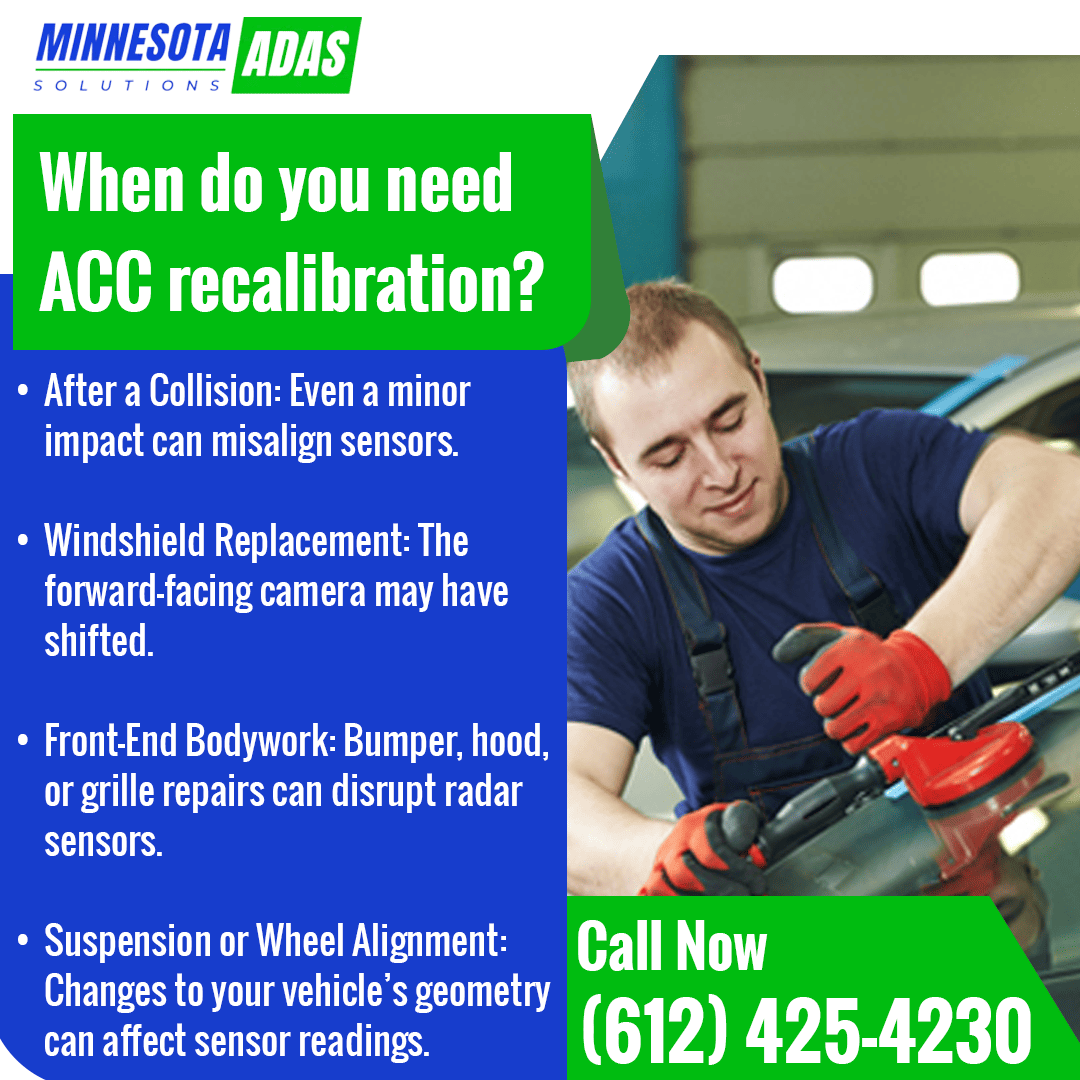Top 5 Post-Repair Scenarios That Require Adaptive Cruise Control Recalibration
Bloomington, United States - November 17, 2025 / Minnesota ADAS Solutions /
Bloomington, MN – Minnesota ADAS Solutions, a trusted provider of Advanced Driver Assistance System (ADAS) services, announces guidance for drivers regarding the need for adaptive cruise control calibration in Bloomington, MN, after vehicle repairs. The company emphasizes the importance of professional recalibration to maintain the performance and reliability of adaptive cruise control systems and preserve the driving benefits these technologies provide.
What is an Adaptive Cruise Control System?
An adaptive cruise control system automatically adjusts vehicle speed to maintain a safe following distance. The system uses radar sensors and cameras to track traffic ahead. Unlike traditional cruise control, it accelerates and brakes without driver input. Many vehicles link ACC with other safety features, such as lane-keeping assist or automatic emergency braking. These systems reduce speed fluctuations, improve highway driving comfort, and help maintain a safer distance from vehicles ahead.
Why Recalibration Matters After Vehicle Repairs
Recalibration restores sensor and camera accuracy after vehicle maintenance or collisions.
Even minor impacts can alter sensor alignment. Collisions, windshield replacements, or suspension adjustments may shift cameras or radar units slightly, affecting braking, acceleration, or alerts. Recalibration brings the system back to proper operation, maintaining the benefits drivers rely on for consistent and safe performance.
Overview of Common Post-Repair Impacts on ACC
Repairs can shift sensors and affect ACC performance. Changes to the front-end structure, windshield, suspension, or software updates can move sensors. Misaligned sensors can cause irregular speed adjustments or false alerts. Recalibration restores accurate distance tracking, smooth acceleration, and coordination with other safety systems, keeping the system functional in various traffic conditions.
Common Scenarios Requiring ACC Recalibration
Collision or Accident Repairs
Minor collisions can misalign ACC sensors, affecting performance. Even low-speed impacts can tilt or shift radar sensors and forward-facing cameras. This may cause unexpected braking, unusual acceleration, or inconsistent alerts. Dashboard warnings or irregular system responses often indicate the ACC needs recalibration. Certified facilities perform diagnostics and adjustments, restoring the system’s accuracy.
Windshield Replacement or Glass Repair
Windshield repairs can affect forward-facing cameras linked to ACC. Cameras attached to or behind the windshield may shift during replacement, impacting lane detection and distance monitoring. Professional recalibration corrects camera positions, restoring the adaptive cruise control benefits and maintaining consistent braking and speed adjustments.
Front-End Bodywork or Panel Replacement
Bumper, hood, or grille repairs can disrupt radar sensor alignment. Front-end components house sensors that track traffic. Even minor shifts from bodywork can delay system responses or trigger false alerts. Certified recalibration measures, adjusts, and tests sensors, allowing the ACC system to function accurately. Adaptive cruise control calibration in Bloomington, MN, restores sensor alignment and system reliability.
Suspension or Wheel Alignment Adjustments
Changes to suspension or wheel alignment can affect ACC sensor readings. Vehicle geometry impacts how sensors measure distances and monitor traffic. Misaligned suspension or wheels can cause uneven acceleration, delayed braking, or irregular alerts. Recalibration compensates for these changes, restoring consistent following distances and system performance.
Software Updates or System Resets
Software updates or resets may alter sensor synchronization. ACC depends on precise coordination between cameras, radar sensors, and vehicle control modules. Updates or resets can shift system communication, causing delayed responses or inconsistent alerts. Recalibration restores synchronization and maintains the ACC system’s ability to adjust speed and respond to traffic accurately.
Choosing the Right Facility for ACC Recalibration in Bloomington, MN
Certified ADAS calibration centers provide controlled, accurate recalibration. Facilities that follow OEM procedures and use specialized tools deliver precise adjustments. Controlled environments reduce errors, helping drivers retain all adaptive cruise control benefits.
Minnesota ADAS Solutions specializes in precise ACC calibration. The Bloomington facility offers diagnostics, repairs, and sensor alignment verification. Most services are completed within 90 minutes. Drivers searching for adaptive cruise control repair near you can access professional services without compromising system accuracy.
Every service includes detailed documentation and verification. Records confirm sensor alignment and system performance for insurers, body shops, and vehicle owners. Adaptive cruise control calibration in Bloomington, MN, at Minnesota ADAS Solutions provides proof that the ACC system meets manufacturer standards.
Schedule ACC Calibration at Minnesota ADAS Solutions Today
Drivers in Bloomington can rely on certified ACC calibration services to maintain vehicle safety and performance. Minnesota ADAS Solutions provides expert sensor alignment, ACC calibration, and full documentation for every service. Call (612) 425-4230 or email info@mnadas.com to schedule an adaptive cruise control repair near you and restore your system’s proper function.

Contact Information:
Minnesota ADAS Solutions
9555 James Ave S
Bloomington, MN 55431
United States
CJ Peeters
(612) 425-4230
https://www.mnadas.com/
Original Source: https://www.mnadas.com/adas/top-5-post-repair-scenarios-that-require-adaptive-cruise-control-recalibration/



